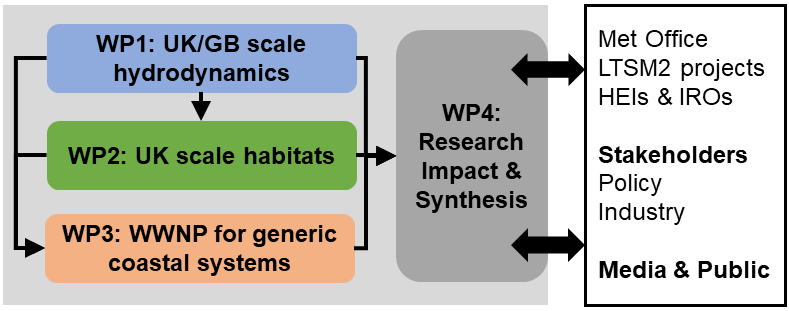CHAMFER will be delivered through the following four work packages.
Work package 1: UK/GB scale terrestrial controls on extreme hydrodynamic conditions
In order to consider the crucial interactions and statistical dependencies between hazards and to obtain reliable estimates of risk, WP1 is underpinned by the development of a coupled modelling system bringing together ocean modelling and terrestrial water cycle modelling. This coupled system will rely on the same elements as the Met Office Regional Environmental Prediction programme. We will apply this coupled modelling system to a selection of present and future scenarios and we will use novel state-of-the-art statistical methods to quantify joint probabilities of multi-hazard events.
Work package 2: Protective services and vulnerability of UK coastal habitats to climate driven multi-hazards
In order to address the emergent properties derived from multi-habitat complexes at a national scale, and to understand the persistence of these benefits under climate change projections, WP2 brings together
- Bayesian statistics to merge habitat properties delivering protective services;
- Existing biological life-history trait databases (terrestrial and marine species) to estimate the restoration and adaptive rates of the species comprising the coastal habitats;
- Multi-species occupancy modelling to spatially model simultaneously multiple habitats;
- Collection of new fieldwork observations targeted at the protective capability provided by coastal habitat assemblages.
Work package 3: The role of nature-based coastal management options
In order to provide increased understanding of how WWNP approaches function in generic coastal system, WP3 will combine established, off-the-shelf and open-source numerical tools to simulate local scale inundation, morphological change, and coastal erosion for a series of generic coastal typologies and nature-based approaches.
Work package 4: Research Impact and Synthesis
WP4 will coordinate external engagement across a wide range of stakeholders, end-users, project partners as well as the wider scientific community. WP4 will also provide synthesis of the scientific evidence throughout the project with the objective that our results will feed into future policy making and coastal management under a changing climate.
